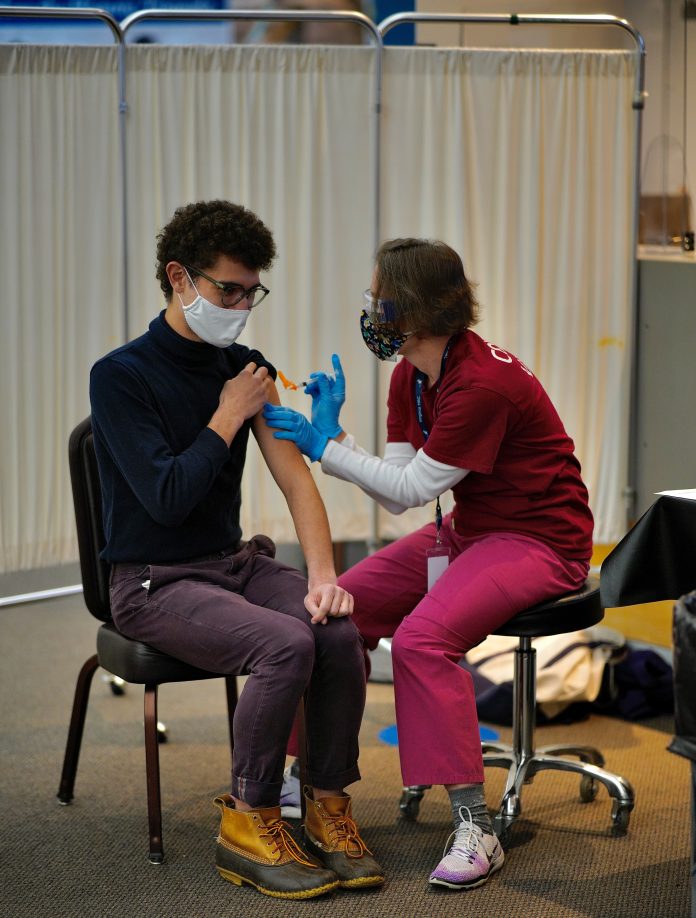In the absence of COVID-19 vaccination mandates by federal, state and local governments, universities in the United States are increasingly requiring vaccination in order to protect their students, faculty and staff from the coronavirus pandemic. Here, the College of William and Mary COVID-19 response team announced July 29 that vaccination against COVID-19 is mandatory for “all students, faculty, and staff,” with limited disability-related and religious exemptions.
No matter what the anti-vaxxers and pundits say, the College’s mandate is sound public policy.
Scientific studies from the Center for Disease Control indicate that unvaccinated people are about 29 times more likely to be hospitalized with COVID-19 and are almost five times more likely to be infected than people who are fully vaccinated. COVID-19 vaccines are working, though the Delta variant is reducing effective rates and making booster shots necessary. As the CDC director said at a White House briefing, “This is becoming a pandemic of the unvaccinated. We are seeing outbreaks of cases in parts of the country that have low vaccination coverage because unvaccinated people are at risk.”
And yet, for a vaccine that is free and readily available to most Americans, with relatively minor documented side effects, voluntary vaccination has been insufficient, and vaccination and mask mandates have drawn pushback, from disinformation spread online, to lawsuits by those required to be vaccinated, to violence threatened against school board members voting on mask measures.
At the national, state and local levels, vaccination rates have stagnated, despite incentives that have included $1 million drawings, free beer and even free cannabis in some jurisdictions. The lesson is that voluntary enforcement is insufficient in the area of public health, just as it is insufficient in areas such as environmental regulation, gun safety and criminal justice reform. For those who study policy, failure of voluntary enforcement is disappointing but not surprising.
Only 52% of the U.S. population (63% of adults over 18) is fully vaccinated against COVID-19. Virginia has only marginally higher vaccination levels, with 56.4% (67.5% of adults over 18) of the population fully vaccinated. In many local jurisdictions across the country, less than half of the population is fully vaccinated. However, in a welcome contrast to low levels of COVID-19 vaccination elsewhere, College community members have not missed their shots.
As news editor Molly Parks observed in the Aug. 24 issue of The Flat Hat, vaccination levels at the College jumped about 20% for students and employees after the mandate’s announcement to an impressive 93% vaccination rate among students and 90% vaccination rate among faculty and staff members. Such nearly universal levels indicate widespread compliance with the mandate and suggest that members of the College community recognize the public health implications.
Moreover, the College is in good company regarding mandatory vaccination. According to the Chronicle of Higher Education, more than 800 college and university campuses, including dozens of Virginia higher education institutions, now require COVID-19 vaccines for at some or all students, faculty,or staff, and Fox News reported that the number of schools with a mandate “continues to grow, after the FDA granted full approval to Pfizer’s two-dose coronavirus shot.”
The College’s mandate is also on sound legal footing, especially after a trial judge, unanimous appellate panel and Supreme Court Justice Amy Coney Barrett rejected a federal lawsuit by students who had challenged Indiana University’s COVID-19 vaccination mandate. The students had argued that the university’s mandate violated their constitutional rights to “bodily integrity, autonomy and medical choice,” despite availability of religious, ethical and medical exemptions.
Notably, in affirming Indiana University’s policy, Judge Frank Easterbrook, who was appointed by President Ronald Reagan, cited the case of Jacobson v. Massachusetts, 197 U.S. 11 (1905). In Jacobson, the Supreme Court upheld a smallpox vaccination mandate by Cambridge based on a Massachusetts authorization law, noting that U.S. public schools long required vaccinations for diseases, and highlighting the “evils of a smallpox epidemic that imperiled an entire population.”
In the Indiana University mandate appeal, the appellate court held that universities may impose measures designed to protect their community members from evils of the COVID-19 pandemic.
“Each university may decide what is necessary to keep other students safe in a congregate setting,” wrote Judge Easterbrook. “Vaccination protects not only the vaccinated persons but also those who come in contact with them, and at a university close contact is inevitable.”
Alan Kennedy J.D. ’09, Ph.D., is a lecturer of public policy. Email Alan at ahkennedy@wm.edu.


What a freaking joke!!! This is NOT SOUND POLICY BY ANY STRETCH OF THE IMAGINATION! This is pay to play! And an absolute DISGRACE for humanity and freedom at this University! Unconstitutional! Junk science! I feel sorry for the normal people who work for this disgraceful place! What does it profit a man to gain the whole world but lose his soul?